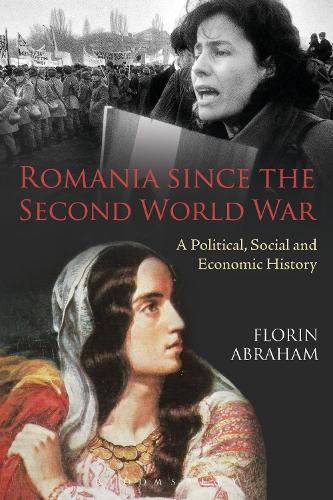
Romania since the Second World War: A Political, Social and Economic History
(Paperback)
Available Formats
Publishing Details
Romania since the Second World War: A Political, Social and Economic History
By (Author) Florin Abraham
Bloomsbury Publishing PLC
Bloomsbury Academic
17th November 2016
United Kingdom
Classifications
Professional and Scholarly
Non Fiction
Political science and theory
General and world history
History and Archaeology
949.803
Physical Properties
Paperback
360
Width 156mm, Height 234mm
508g
Description
CHOICE Outstanding Academic Title 2017 Romania since the Second World War is the first book about Romania designed to chart the progress of the nation under the communist regime as well as the transition period that followed, providing detailed analysis of the aspects of continuity and change that can be identified over the period as a whole. The book begins with Romania's involvement in the Second World War, looking at the communist regime in depth. It examines how communism took hold and the elimination of traditional elites took place, before discussing the impact of Gheorghiu-Dej and Nicolae Caeusescu, the two most important leaders of the communist era. The following chapters cover the main social and economic changes during the communist regime. The second part of the book explores the transition period following the end of communism in 1989, with special attention given to international relations and Romania's drive for inclusion in NATO and the EU. Romania since the Second World War assesses socio-demographic trends across the postwar period before concluding with some thoughts on the nation's development during this time. The book includes a useful appendix covering the key figures in Romania's recent history and a helpful bibliography, making this a key text for anyone interested in the modern history of Eastern Europe.
Reviews
This very broad temporal and thematic scope alone makes Abrahams volume a welcome addition to the Romanian Studies collection of any individual or institutional library [It] offers a wealth of data and facts that many readers might want to access quickly. * Canadian Slavonic Papers *
The book draws on a rich and diverse bibliography and has a well thought through structure. Contemporary events are always put into historical perspective, thus making it easier to discern continuity and change ... It is also worth noting the presence of topics not usually tackled in similar works (culture and arts and sport), as well as an appendix containing short biographies of historical personalities ... This is an informative, well-written and accessible book, which will be of use for a wide range of readers, from scholars and students to the general public. * European History Quarterly *
This is a comprehensive and valuable study ... The thematic structure of the book means that it will serve as a useful resource for students and researchers seeking to understand specific issues as well as broader patterns of development. * Journal of Contemporary European Studies *
Abraham, lecturer in political studies in Bucharest, provides an accessible, sophisticated, scholarly account of major trends in Romanias history since 1945 Coverage of the communist period (particularly the bizarre form of dynastic communism Ceausescu inflicted on Romania) is admirable, but the authors greatest contribution is the very detailed explanation of Romanias meandering political path since 1989, which takes up two-thirds of the book. Abraham discusses party politics, political institutions, foreign policy, legal developments, society, economy, and demography. Though the level of detail may seem forbidding for students, the authors clear writing makes the sometimes baffling events of the past quarter century come to life, often vividly. For anyone interested in recent historical developments in one of the EUs youngest members. Summing Up: Highly recommended. Upper-division undergraduates and above. * CHOICE *
Florin Abraham's book is the latest contribution to a scholarly tradition represented by such esteemed authors as Ghita Ionescu, Stephen Fischer-Galati, Vlad Georgescu and Vladimir Tismaneanu. Written in an accessible style, attentive to historical sources, and covering more than half a century of Romanian political history, the book provides readers with a valuable and insightful foray into a very complex period in modern European and global history. It has immediate relevance for all of us interested in twentieth century political history, and beyond. * Marius Turda, Oxford Brookes University, UK *
Abrahams book triggers the readers comprehension of the difficulties Romania had to overcome during transformation. Even experts will benefit from this book. Abraham takes a broad look at Romania today and quite pointedly takes a stand, touching on numerous subjects: political institutions, parties, the educational system, churches, economic interrelations, foreign policy and demographic development. The story of the recurrent violent social protest after 1989 is especially interesting. Abraham describes the widespread insecurity in the country, the split in Romanian society and the tendency to authoritarian solutions. A committed plea to face the complexity of the present! * Armin Heinen, RWTH Aachen University, Germany *
Author Bio
Florin Abraham is Senior Researcher at the National Institute for the Study of Totalitarianism at The Romanian Academy and Lecturer at The National University of Political Studies and Public Administration, Romania.
